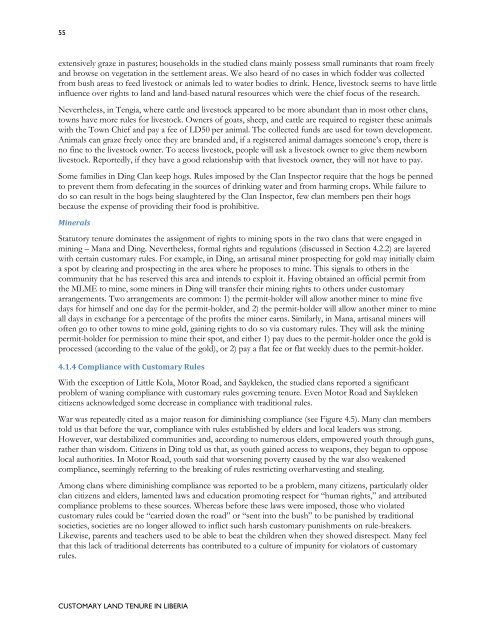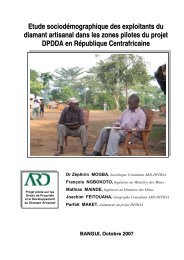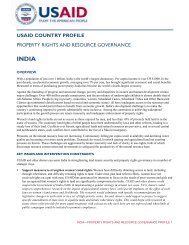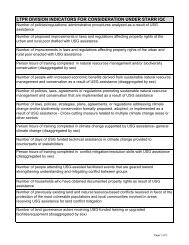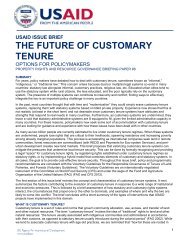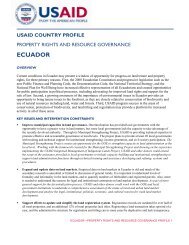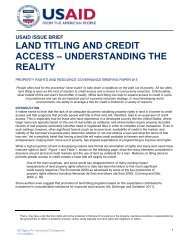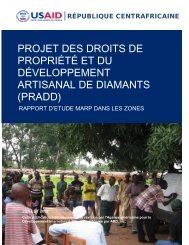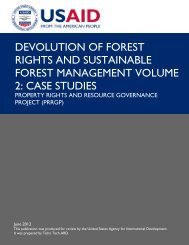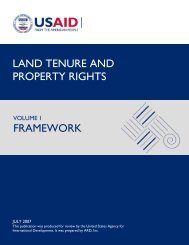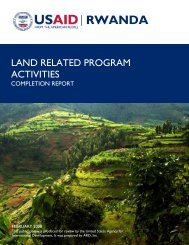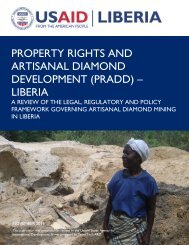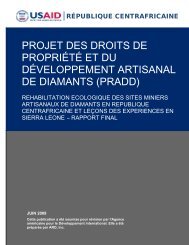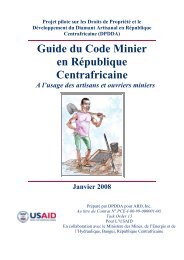Customary Land Tenure in Liberia - Land Tenure and Property ...
Customary Land Tenure in Liberia - Land Tenure and Property ...
Customary Land Tenure in Liberia - Land Tenure and Property ...
Create successful ePaper yourself
Turn your PDF publications into a flip-book with our unique Google optimized e-Paper software.
55<br />
extensively graze <strong>in</strong> pastures; households <strong>in</strong> the studied clans ma<strong>in</strong>ly possess small rum<strong>in</strong>ants that roam freely<br />
<strong>and</strong> browse on vegetation <strong>in</strong> the settlement areas. We also heard of no cases <strong>in</strong> which fodder was collected<br />
from bush areas to feed livestock or animals led to water bodies to dr<strong>in</strong>k. Hence, livestock seems to have little<br />
<strong>in</strong>fluence over rights to l<strong>and</strong> <strong>and</strong> l<strong>and</strong>-based natural resources which were the chief focus of the research.<br />
Nevertheless, <strong>in</strong> Tengia, where cattle <strong>and</strong> livestock appeared to be more abundant than <strong>in</strong> most other clans,<br />
towns have more rules for livestock. Owners of goats, sheep, <strong>and</strong> cattle are required to register these animals<br />
with the Town Chief <strong>and</strong> pay a fee of LD50 per animal. The collected funds are used for town development.<br />
Animals can graze freely once they are br<strong>and</strong>ed <strong>and</strong>, if a registered animal damages someone‟s crop, there is<br />
no f<strong>in</strong>e to the livestock owner. To access livestock, people will ask a livestock owner to give them newborn<br />
livestock. Reportedly, if they have a good relationship with that livestock owner, they will not have to pay.<br />
Some families <strong>in</strong> D<strong>in</strong>g Clan keep hogs. Rules imposed by the Clan Inspector require that the hogs be penned<br />
to prevent them from defecat<strong>in</strong>g <strong>in</strong> the sources of dr<strong>in</strong>k<strong>in</strong>g water <strong>and</strong> from harm<strong>in</strong>g crops. While failure to<br />
do so can result <strong>in</strong> the hogs be<strong>in</strong>g slaughtered by the Clan Inspector, few clan members pen their hogs<br />
because the expense of provid<strong>in</strong>g their food is prohibitive.<br />
M<strong>in</strong>erals<br />
Statutory tenure dom<strong>in</strong>ates the assignment of rights to m<strong>in</strong><strong>in</strong>g spots <strong>in</strong> the two clans that were engaged <strong>in</strong><br />
m<strong>in</strong><strong>in</strong>g – Mana <strong>and</strong> D<strong>in</strong>g. Nevertheless, formal rights <strong>and</strong> regulations (discussed <strong>in</strong> Section 4.2.2) are layered<br />
with certa<strong>in</strong> customary rules. For example, <strong>in</strong> D<strong>in</strong>g, an artisanal m<strong>in</strong>er prospect<strong>in</strong>g for gold may <strong>in</strong>itially claim<br />
a spot by clear<strong>in</strong>g <strong>and</strong> prospect<strong>in</strong>g <strong>in</strong> the area where he proposes to m<strong>in</strong>e. This signals to others <strong>in</strong> the<br />
community that he has reserved this area <strong>and</strong> <strong>in</strong>tends to exploit it. Hav<strong>in</strong>g obta<strong>in</strong>ed an official permit from<br />
the MLME to m<strong>in</strong>e, some m<strong>in</strong>ers <strong>in</strong> D<strong>in</strong>g will transfer their m<strong>in</strong><strong>in</strong>g rights to others under customary<br />
arrangements. Two arrangements are common: 1) the permit-holder will allow another m<strong>in</strong>er to m<strong>in</strong>e five<br />
days for himself <strong>and</strong> one day for the permit-holder, <strong>and</strong> 2) the permit-holder will allow another m<strong>in</strong>er to m<strong>in</strong>e<br />
all days <strong>in</strong> exchange for a percentage of the profits the m<strong>in</strong>er earns. Similarly, <strong>in</strong> Mana, artisanal m<strong>in</strong>ers will<br />
often go to other towns to m<strong>in</strong>e gold, ga<strong>in</strong><strong>in</strong>g rights to do so via customary rules. They will ask the m<strong>in</strong><strong>in</strong>g<br />
permit-holder for permission to m<strong>in</strong>e their spot, <strong>and</strong> either 1) pay dues to the permit-holder once the gold is<br />
processed (accord<strong>in</strong>g to the value of the gold), or 2) pay a flat fee or flat weekly dues to the permit-holder.<br />
4.1.4 Compliance with <strong>Customary</strong> Rules<br />
With the exception of Little Kola, Motor Road, <strong>and</strong> Saykleken, the studied clans reported a significant<br />
problem of wan<strong>in</strong>g compliance with customary rules govern<strong>in</strong>g tenure. Even Motor Road <strong>and</strong> Saykleken<br />
citizens acknowledged some decrease <strong>in</strong> compliance with traditional rules.<br />
War was repeatedly cited as a major reason for dim<strong>in</strong>ish<strong>in</strong>g compliance (see Figure 4.5). Many clan members<br />
told us that before the war, compliance with rules established by elders <strong>and</strong> local leaders was strong.<br />
However, war destabilized communities <strong>and</strong>, accord<strong>in</strong>g to numerous elders, empowered youth through guns,<br />
rather than wisdom. Citizens <strong>in</strong> D<strong>in</strong>g told us that, as youth ga<strong>in</strong>ed access to weapons, they began to oppose<br />
local authorities. In Motor Road, youth said that worsen<strong>in</strong>g poverty caused by the war also weakened<br />
compliance, seem<strong>in</strong>gly referr<strong>in</strong>g to the break<strong>in</strong>g of rules restrict<strong>in</strong>g overharvest<strong>in</strong>g <strong>and</strong> steal<strong>in</strong>g.<br />
Among clans where dim<strong>in</strong>ish<strong>in</strong>g compliance was reported to be a problem, many citizens, particularly older<br />
clan citizens <strong>and</strong> elders, lamented laws <strong>and</strong> education promot<strong>in</strong>g respect for “human rights,” <strong>and</strong> attributed<br />
compliance problems to these sources. Whereas before these laws were imposed, those who violated<br />
customary rules could be “carried down the road” or “sent <strong>in</strong>to the bush” to be punished by traditional<br />
societies, societies are no longer allowed to <strong>in</strong>flict such harsh customary punishments on rule-breakers.<br />
Likewise, parents <strong>and</strong> teachers used to be able to beat the children when they showed disrespect. Many feel<br />
that this lack of traditional deterrents has contributed to a culture of impunity for violators of customary<br />
rules.<br />
CUSTOMARY LAND TENURE IN LIBERIA


